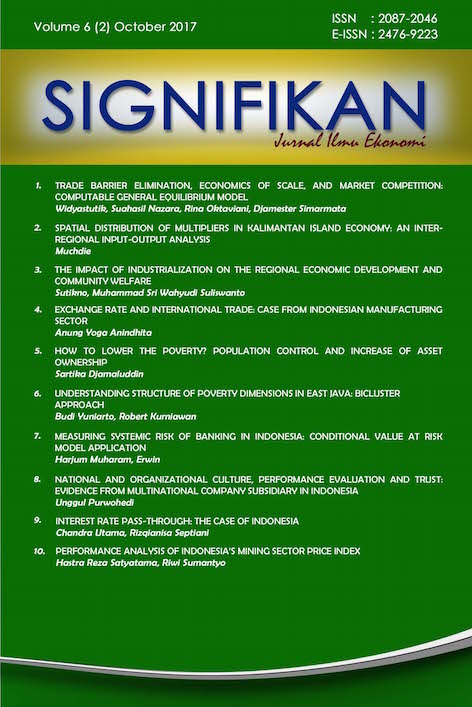How to Lower the Poverty?: Population Control and Increase of Asset Ownership
DOI:
https://doi.org/10.15408/sjie.v6i2.5096Keywords:
poverty characteristic, logistic model, population control, asset ownershipAbstract
This study is intended to identify and analyze factors that influence the poverty rate in households in West Java. The study was carried out at three regional levels namely the provincial, district and municipal levels in West Java. This study used the model of logistic regression using the data from the national socioeconomic survey (Susenas) on household. The total number of households observed was 20.541 households. The findings indicate that control of total number of household members and asset ownership is the main factor that lowers the poverty rate in households in all regions. However factors that lower the probability of poverty in each district and municipality are varies. Another finding from the study is that financial aid from the community to support family spending is not always significant in lowering the probability of a household to be poor.
References
Afandi, W.N. (2011). Identification of Poverty Characteristics of Household in Padang Pariaman District, (Case study: Nagari Malai V Suku). (Unpublished Thesis). Padang: Program Pascasarjana Universitas Andalas.
Geda, A., N.D. Jong., G. Mwabu & M.S. Kimenyi. (2001). Determinant of Poverty in Kenya: Household Level Analysis. Working paper, Institute of Social Studies.
Hayati, A. (2012). Änalisis Resiko Kemiskinan Rumah Tangga di propinsi Banten (Analysis of the Risks of Household Poverty in Banten Province). (Unpublished Thesis). Depok: Universitas Indonesia.
Haughton, J. & S.R. Khandker. (2009). Handbook on Poverty and Inequality. New York: The Worldbank.
Margaretha, C. (2014) Faktor-faktor yang mempengaruhi Status Rumah Tangga Miskin di Indonesia (Factors Influencing the Status of Poor Households in Indonesia), (Unpublished Thesis). Depok: Universitas Indonesia.
Mok T.Y., C. Gan and A. Sanyal. (2007). The Determinants of Urban Household Poverty in Malaysia. Working Paper. Cartenbury: Lincoln University.
Mukherjee, S. (1998). The Determinant of Poverty in Malawi. Bangkok: International Labour Organization.
Prasetyo, A.A. (2010). Analisis Faktor-Faktor yang Mempengaruhi Tingkat Kemiskinan: Studi kasus 35 Kabupaten/Kota di Jawa Tengah tahun 2003 – 2007 (Analysis of Factors influencing Poverty Rate: Case study, 35 Districts/Municipalities in Central Java years 2003 - 2007). (Unpublished Thesis). Semarang: Universitas Diponegoro.
Putra, M.M.D. (2014). Determinan Kemiskinan di Kabupaten /Kota Propinsi Jawa BaratTahun 2008 – 2012 (Determinants of Poverty in Districts/Municipalities in West Java Years 2008-2012). (Unpublished Thesis). Depok: Universitas Indonesia.
Sari, A.C.D.M. (2012). Pengaruh kepemilikan Aset, Pendidikan, pekerjaan dan jumlah tanggungan Terhadap kemiskinan rumah tangga di Kecamatan Bonang, Kabupaten Demak (Influence of Asset Ownership, Education, Work and Number of Dependants on household poverty in Bonang Sub-District, Demak District). (Unpublished Thesis). Semarang: Universitas Diponegoro.
Usman, B.M.S. & H. Siregar. (2006). Analisis Determinan Poverty Sebelum dan sesudah Desentralisasi Fiskal (Analysis of the Determinants of Poverty before and after Fiscal Decentralization). Working Paper. Institut Pertanian Bogor.


